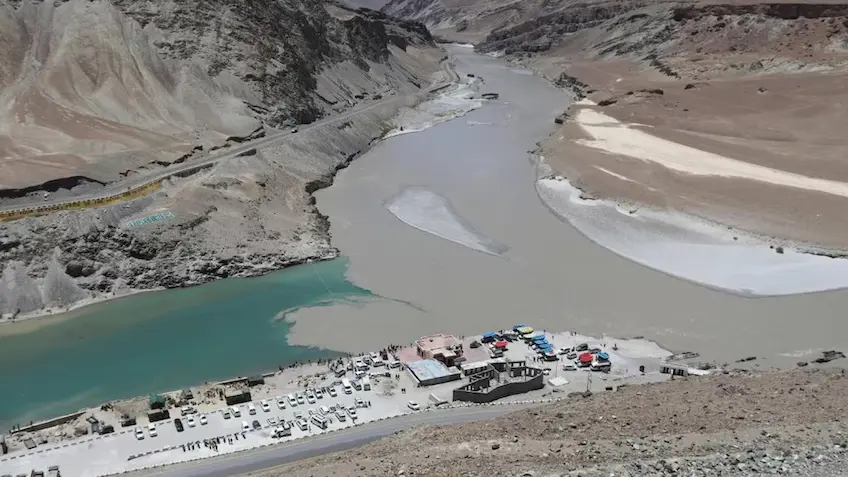
India’s decision to place the Indus Waters Treaty in abeyance following the Pahalgam terror attack has ignited a fierce legal and diplomatic debate
A Treaty in Turmoil: India’s Bold Move and Its Fallout
In a dramatic shift in South Asia’s diplomatic landscape, India has placed the 1960 Indus Waters Treaty (IWT) “in abeyance,” citing Pakistan’s continued support for cross-border terrorism. The move, announced in the aftermath of the April 22 Pahalgam terror attack, marks the first time India has suspended its obligations under the landmark water-sharing agreement.
The IWT, brokered by the World Bank, has long been hailed as a rare example of India-Pakistan cooperation, surviving wars and political upheavals. It allocates the waters of six rivers between the two nations, with the western rivers (Indus, Jhelum, Chenab) flowing to Pakistan and the eastern rivers (Ravi, Beas, Sutlej) reserved for India.
India’s Ministry of External Affairs (MEA) declared that the treaty would remain suspended “until Pakistan credibly and irrevocably abjures its support for cross-border terrorism.” The government emphasized that it is no longer bound to perform any obligations under the treaty during this period.
However, this unprecedented action has sparked intense debate. While some view it as a necessary assertion of sovereignty and a strategic countermeasure, others including strategic affairs expert Brahma Chellaney warn that the move is a “half-measure” lacking legal clarity. “Abeyance,” he argues, is not a recognized concept in international law, creating a legal vacuum that could backfire diplomatically.
The Legal Quagmire: Is ‘Abeyance’ a Valid Strategy?
The term “abeyance” refers to a temporary suspension, but it has no formal standing under international treaty law. Neither the Indus Waters Treaty nor the Vienna Convention on the Law of Treaties (VCLT) recognizes unilateral suspension without mutual consent or a defined legal basis such as material breach or impossibility of performance.
Chellaney contends that India should have either formally suspended or withdrawn from the treaty under international law, rather than opting for a symbolic pause. “This ambiguous approach,” he warns, “is now producing consequences,” including challenges to India’s legal position in international forums.
The controversy intensified when the Permanent Court of Arbitration (PCA) in The Hague issued a “supplemental award” asserting its competence to adjudicate disputes over India’s Kishenganga and Ratle hydroelectric projects in Jammu & Kashmir. India rejected the ruling outright, calling the PCA an “illegally constituted” body acting at Pakistan’s behest.
India maintains that it has never recognized the PCA’s jurisdiction in this matter and continues to engage only with the neutral expert mechanism outlined in the treaty. The MEA labeled the arbitration proceedings a “charade” and a “fabricated mechanism” designed to deflect attention from Pakistan’s role in fostering terrorism.
Strategic Stakes: Water, War, and Regional Stability
Beyond the legal wrangling lies a deeper strategic calculus. Water is a critical resource in the India-Pakistan equation, and the IWT has long served as a stabilizing force. By placing the treaty in abeyance, India is signalling a willingness to use water diplomacy as leverage a move that could reshape regional dynamics.
Supporters of the decision argue that it sends a strong message to Pakistan: continued support for terrorism will have tangible consequences. They see it as part of a broader shift in India’s foreign policy, where restraint is giving way to assertiveness.
However, critics caution that tampering with the IWT could set a dangerous precedent. The treaty has been a cornerstone of peace in an otherwise volatile relationship. Undermining it could escalate tensions, invite international scrutiny, and weaken India’s moral high ground.
Moreover, the ambiguity surrounding “abeyance” leaves room for misinterpretation. Without a clear legal framework, India risks being portrayed as violating international norms, potentially eroding its credibility on the global stage.
Conclusion:
India’s decision to suspend the Indus Waters Treaty is a watershed moment both literally and figuratively. It reflects a growing impatience with Pakistan’s intransigence but also exposes the limits of symbolic diplomacy. As legal experts warn of a “vacuum,” and international bodies assert jurisdiction, the path ahead is fraught with complexity. Whether this bold move will yield strategic dividends or diplomatic backlash remains to be seen. What’s clear is that water, once a symbol of cooperation, is now a flashpoint in South Asia’s evolving power play.
Stay updated with the latest news on Rapido Updates. Keep yourself updated with The World, India News, Entertainment, Market, Automobile, Gadgets, Sports, and many more